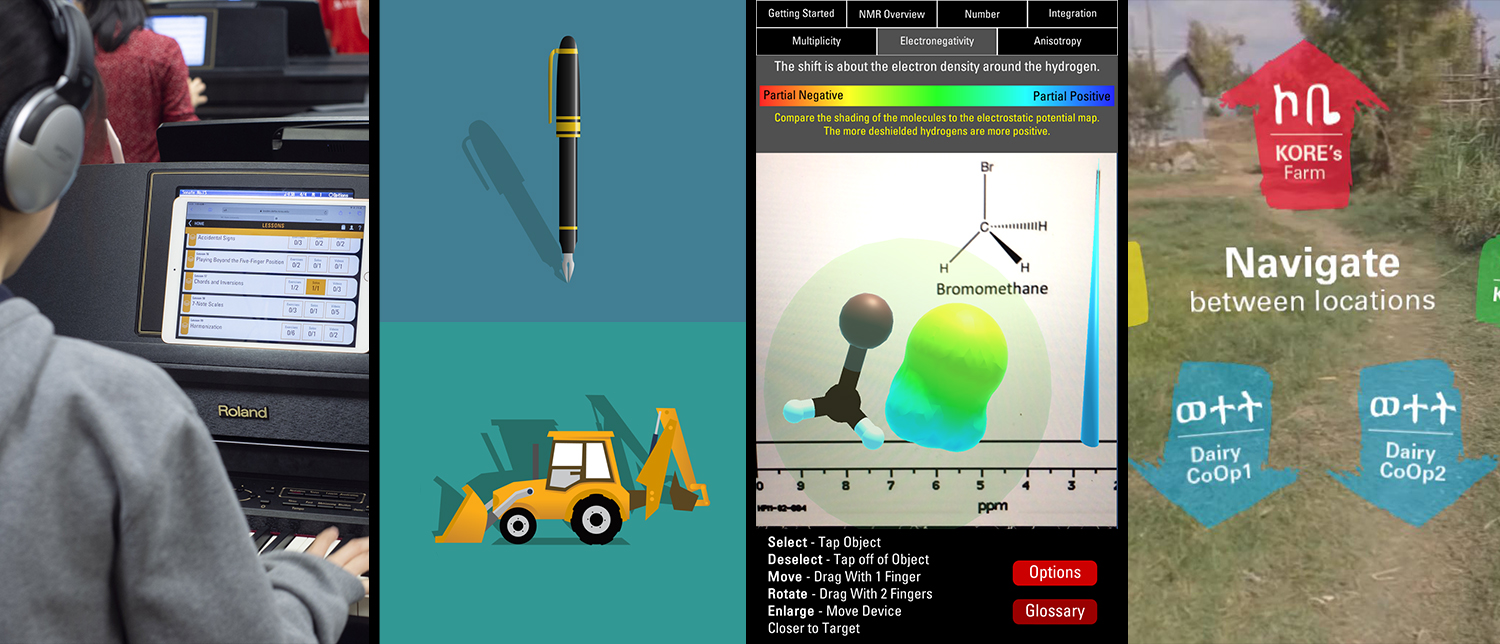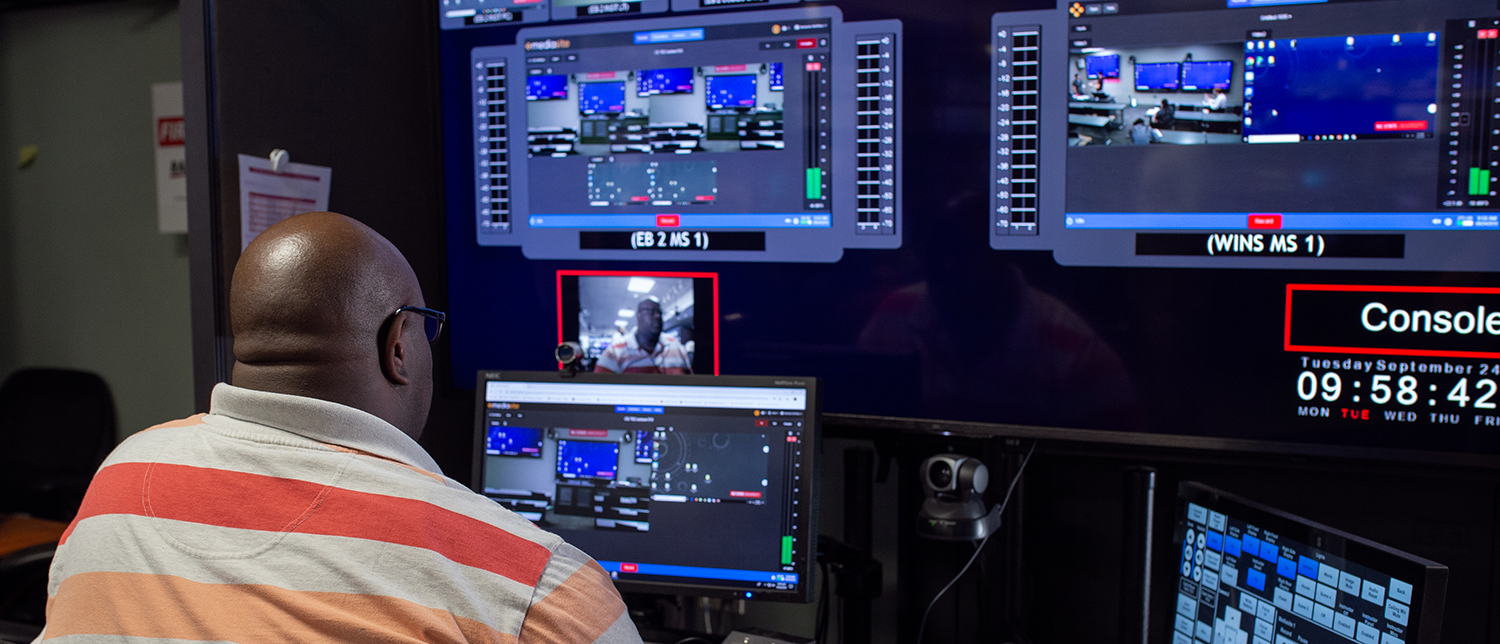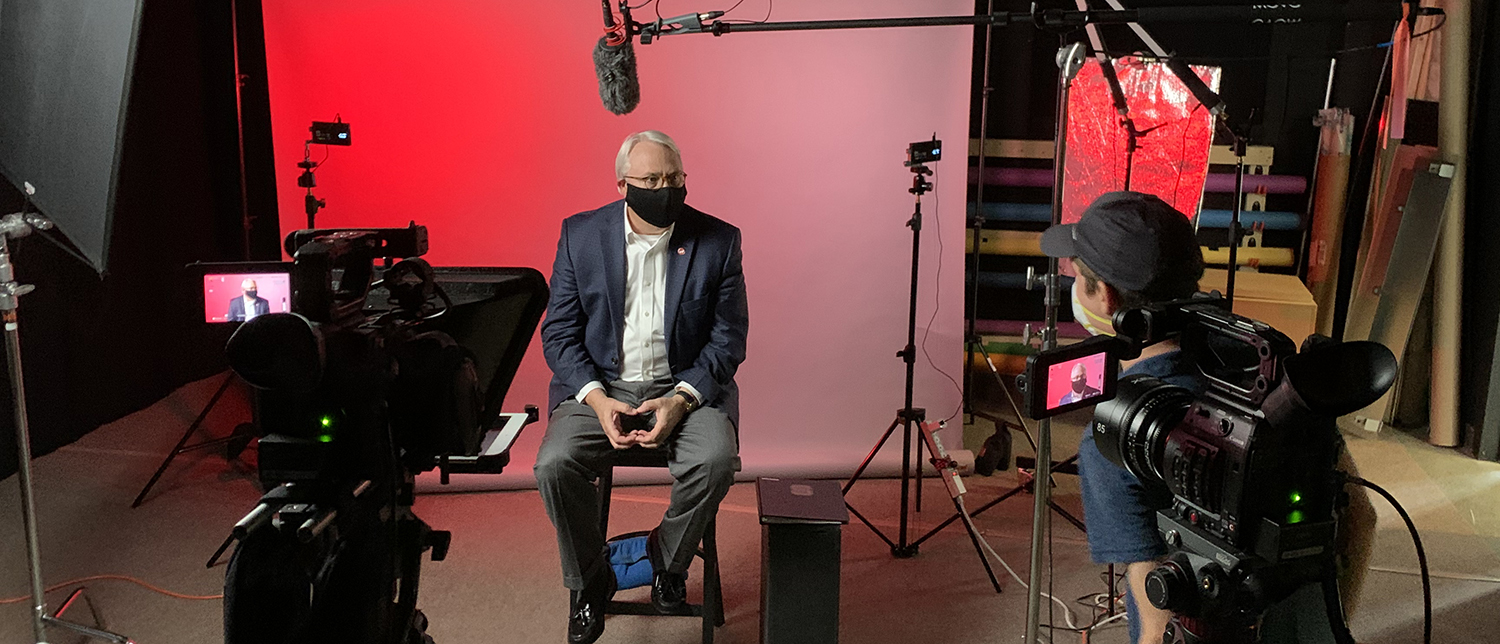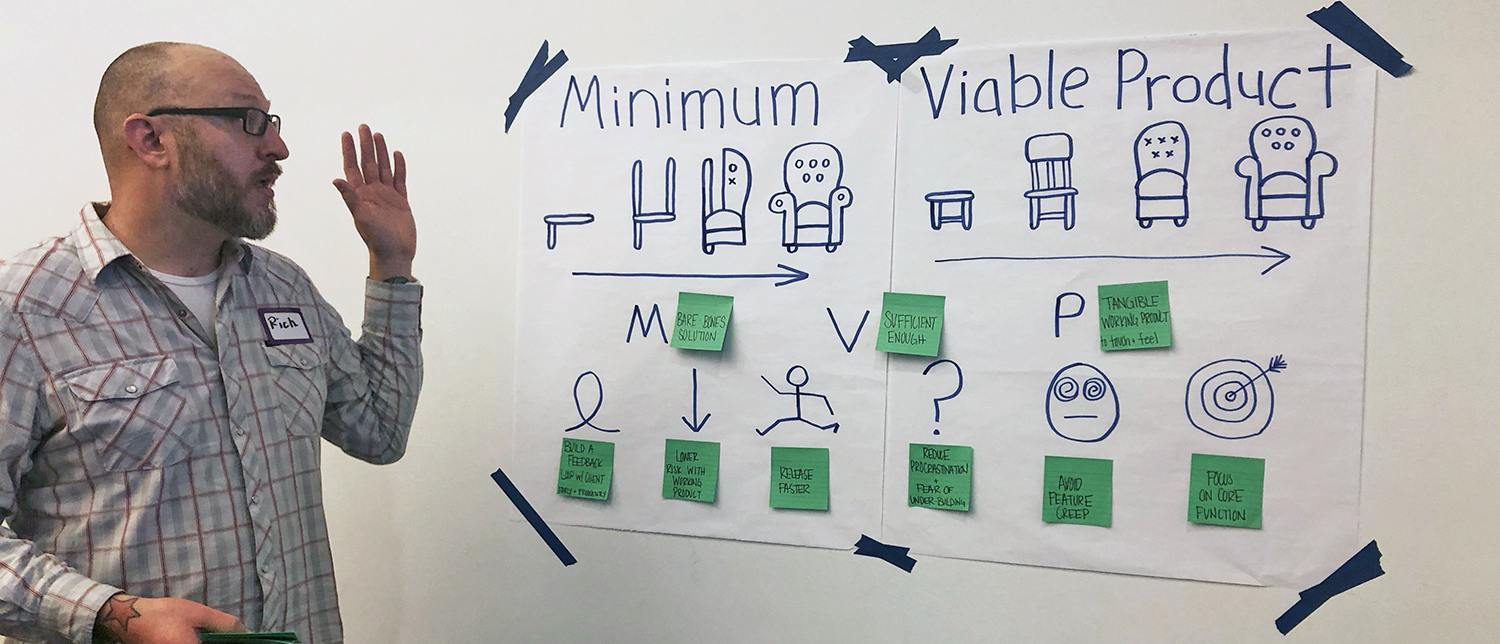DELTA strives to positively impact the NC State community by providing excellent support to students, faculty and staff and leading the way for innovative learning. As the Wolfpack at home, across the country and abroad adapted to unprecedented changes this year, we worked hard to ensure that students and educators had what they needed to succeed and that, along the way, we continued to deliver on our promise to provide high-quality education to all learners.
Explore each section to read specific stories and learn how we worked toward our strategic goals while backing the Wolfpack during difficult times.
 In response to COVID-19 and the subsequent shift to remote instruction, the DELTA Communication Team worked with staff and campus partners to produce articles to help instructors navigate the new learning environment. Explore the stories on DELTA News.
In response to COVID-19 and the subsequent shift to remote instruction, the DELTA Communication Team worked with staff and campus partners to produce articles to help instructors navigate the new learning environment. Explore the stories on DELTA News.

DELTA Goal 1: Leverage learning technologies to improve student success.
[Aligns with University Goals 1 and 2]
- Refocused all staff energy around helping instructors transition to emergency remote teaching to finish the spring semester in response to COVID-19, using many DELTA staff who do not normally do front-line instructor support to ensure NC State would be successful in this transition.
- Converted courses online for the summer semester (with in-depth/hands-on assistance given to 47 instructors for 97 summer course sections), and worked with numerous faculty in planning for fall 2020.
- Developed a series of new workshops specifically related to instructional continuity and moving online as a result of COVID-19. DELTA and the Office of Faculty Development offered four sessions of the Keep Teaching workshop to 173 virtual attendees. The Getting Your Course Online Quickly workshop was offered six times and had 182 attendees. From March to May 11, DELTA Workshops were attended by 610 participants.
- Offered 112 teaching with technology workshops for 1,099 attendees. Additionally, 58 NC State faculty members attended the 2019 Summer Shorts in Instructional Technologies program and the 2020 DELTA-Con unconference garnered 52 unique attendees from higher education institutions across the state.
- Provided 152 instructional consultations through May 30, 2020. DELTA partnered with multiple colleges to deliver discipline-focused academic continuity seminars.
- Awarded $252,019 toward DELTA Grants (including course redesigns and Faculty Fellows), working on course components, entire course redesigns and the creation of new online and distance education courses, impacting 38 courses and thousands of students.
- Developed a targeted DELTA Grants outreach strategy, reaching out to faculty and administrators to present information about DELTA Grants. Created a Google Site to assist faculty with the proposal submission process.
- Supported five DELTA Faculty Fellows in sharing teaching with technology best practices. Along with providing valuable insight into DELTA Workshops programming, the Faculty Fellows partnered with instructional technologists to teach and provide concrete examples of technology and pedagogical approaches in their courses, including 13 sessions which had 100 unique enrollments.
- Conducted a large course redesign assessment, which illustrates that course redesigns can significantly improve student learning outcomes, engagement, and/or retention. Post-redesign data from student feedback surveys show students maintain a high interest in the course subject and high engagement with course activities and materials. 6,685 students have been impacted from all assessment and evaluation of course and tool design, development and implementation initiatives.
- Funded an Open Textbook grant program as part of the OpenStax Institutional Partner Program with Rice University, awarding $33,000 for instructors to use open textbooks in order to reduce student costs. The first wave of projects will impact 4,595 students per year with an average savings of between $45 and $173 per year on textbooks.
- Met regularly with NC State University Libraries and NC State Bookstores staff to discuss cost reduction initiatives as part of the Academic Materials Affordability Committee. Informed and shaped the discussion about the cost of access codes and other course costs more broadly.
- Partnered with Unicon to test a learning analytics processor (LAP) for our enterprise academic technology environment. The Learning Analytics Project is an effort to leverage technology that can look at an individual student’s current course activity and performance using a mathematical model to predict how well a given student might perform in a course. Began another pilot program in spring 2020 with 10 participants. Partnered with the Department of Computer Science to fund a graduate student to work with us on implementing the pilot and researching the model.
- Expanded course quality assurance efforts by providing more professional development programs, resources, instructional design support, and recognition for faculty who teach online and hybrid. The Course Quality Program impacted more than 8,000 students and 72 faculty along with 36 Quality Matters recognized online and blended courses.
- Produced 16 articles during the COVID-19 pandemic in collaboration with NC State faculty and DELTA staff to support students and faculty during the shift to remote instruction.
- Produced a special edition of the DELTA Connections newsletter in early April to quickly share with faculty the most pertinent information related to academic continuity. The newsletter included tips for quickly getting online, links to DELTA Workshops and the DELTA LearnTech YouTube channel for quick tutorials on Moodle and Zoom, online accessibility, DELTA LearnTech help desk contact information and more. The special edition newsletter had a 71% open rate — higher than our average 52-58% open rate.

DELTA Goal 2: Lead the research, implementation and support of innovative, scalable and reliable learning technologies and methodologies.
[Aligns with University Goals 1 and 3]
- Purchased and implemented a site license for Respondus LockDown Browser and Monitor to quickly facilitate online test monitoring. Monitored 9,875 exams in spring 2020 via Respondus.
- Responded to a 280% increase in LearnTech calls and a 188% increase in Mediasite calls between March and May as compared to last year. This jump is attributed to the transition to remote instruction and increased demand for DELTA support services as a result of COVID-19.
- Continued to invest in a robust, reliable and redundant systems infrastructure that can handle increasing user demands to support our enterprise technology services.
- Created a Quick Start Course Shell structure for Moodle based on the Quality Matters Higher Education Rubric. The shell was deployed in March 2020 along with a user guide, and as of June 2020, it has been used for 210 Moodle course spaces.
- Acquired a Gradescope license with 37 faculty actively using the product in 94 courses with 6,961 enrollments.
- Added Mediasite integration to Moodle to streamline the process of creating, managing and adding video assets to Moodle.
- Participated in the international Moodle community by contributing ideas and/or code toward eight different Moodle items.
- Deployed PlayPosit as an enterprise-level tool to transform any video into an interactive learning experience by embedding questions, images, audio and other media elements.
- Enhanced Zoom security measures to increase safety in the university environment.
- Purchased campusM to investigate its feasibility as a development platform/mobile delivery tool for WolfWare.
- Maintained a central operations center, specialized capture studios, and 10 media-enhanced distance learning classrooms in support of distance education at NC State. Numerous projects took place to improve workflows, install new technologies and improve redundancy in critical areas of the classroom infrastructure.
- Conducted a complete makeover of DELTA’s two mini studios to include technology upgrades, new lighting and furniture. The process for booking the two facilities was streamlined in fall 2019.
- Began installation of physical firewall devices for our production environment, addressing a need for more network security. Partnered with the Office of Information Technology (OIT) in the new EDC environment for network security.
- Managed a large increase in lecture capture usage — a 25% increase in presentations available (198,333) and a 21% increase in the number of presentations watched (48,535). More than 50,000 unique users logged on to view NC State course lectures and presentations 1,959,819 times, from 106,307 IP addresses. Content was viewed for 469,372 hours which amounts to 19,557 24-hour days.
- Leveraged high-end rendering workstations to support virtual reality and immersive technology production in 12 courses.
- Completed 63 unique multimedia projects and delivered 193 videos and/or livestreams/remote captures. Examples of content included learning videos, tutorials, 360° virtual and augmented reality projects, underwater videography and drone photography, and many interviews with subject matter experts.
- Equipped faculty and staff with specialized, high-end 360° camera equipment and provided training for them to become primary content producers.
- Collaborated with Arnav Jhala of the Visual Narrative Faculty Research Cluster. Supported his work with graduate students from France, helping him set up and use a Magic Leap augmented reality headset for molecular visualization and data translation.
8,336 Enrollments
in WolfWare Outreach
DELTA Goal 3: Leverage learning technologies to support Outreach and Engagement activities.
[Aligns with University Goals 4 and 5]
- Met with more than 35 faculty and new programs interested in WolfWare Outreach (WWO) services. Conducted 16 research projects for potential new non-credit programs including environmental scans, feasibility studies and competitive and trend analyses.
- Supported 118,476 WWO registrations and 31 campus clients.
- Adjusted the WWO hosting charge from $7.93 to $7.29.
- Enhanced REPORTER to support WWO, including consistent naming and icons for University Logins, a simplified catalog search and upgraded reporting, registration and financials.
- Conducted 43 instructional technology internal consultations and trainings for 19 departments and divisions at NC State.
- Worked closely with the McKimmon Center for Extension and Continuing Education, specifically in Business Services and Marketing. Strategic marketing support included 15 market research projects, completion of a SWOT analysis, workflow and process refinement, marketing needs assessment, and identification of marketing best practices. Shared new technologies to support the conversion of face-to-face programs into online formats and identified new strategic business opportunities and models for non-credit offerings.
- Developed a formal partnership between the Provost and Senior Vice Provost for Academic Outreach and Entrepreneurship to share DELTA staff members’ time with the McKimmon Center for Extension and Continuing Education to expand marketing services, develop new programs and offerings, implement new technologies and create strategies to reach new target audiences.
- Invested time with UNC System Office efforts to prepare instructors to teach online. Provided materials/consultations toward development of a two-week remote course on teaching online for all instructors in the UNC System. Lead Instructional Designers Jakia Salam and Yan Shen also assisted two teams of UNC System faculty (Chemistry I and Chemistry II) in collecting and organizing course materials for large enrollment undergraduate digital courses.

DELTA Goal 4: Support the creation and delivery of programs and courses that meet strategic enrollment planning and workforce needs for North Carolina and beyond.
[Aligns with University Goals 1 and 5]
- Continued to partner with NC State colleges to develop high-quality online and distance education programs to meet the needs of North Carolina. A Graduate Certificate in Renewable Energy Assessment and Development was approved this year.
- Supported several programs with $151,000 in DE Planning and Development Funds, including the Graduate Certificate in Renewable Energy Assessment and Development, the Doctor of Design and Master of Arts in Teaching.
- Facilitated an EAB Marketing Automation Student Recruitment Pilot to provide strategic marketing for Engineering Online (16 programs) and the College of Agriculture and Life Sciences (3 programs).
- Participated in student recruitment at eight military education fairs and events.
- Supported the creation of Wicked Problems, Wolfpack Solutions for all 4,800+ fall 2020 incoming first-year students, coordinating course development with 33 faculty from multiple disciplines across the university.
- Created the new careers-focus and centralized student recruitment marketing strategy. This included the online and distance education (ODE) website revision with an innovative career section equipped with dynamic job market data and enhancement and integration of the Burning Glass Labor Insight™ and Career Insight™ platforms. Initiatives were modified and changed during the COVID-19 pandemic to reflect accurate data and messaging.
- Continued to position NC State ODE programs to capture market share of prospective online students by introducing new strategies and technologies, expanding market research resources and reporting and expanding social media communications, marketing and advertising.
- Developed and launched multiple social media advertising campaigns on Facebook and LinkedIn to increase general brand awareness as well as traffic campaigns for specific online and distance education program target areas. Launched campaigns in response to COVID-19 to promote NC State online and distance education programs as options for people who may have lost their jobs. The combined paid campaigns earned 192,384 impressions and 800 website visits.
- Conducted competitive analysis and implemented market research of existing ODE programs through the use of the Education Advisory Board custom research services and the UPCEA Center for Research and Strategy custom research services. Additionally, we have licensed the Burning Glass platforms: Labor Insight™, Program Insight™ and Career Insight™ for market research purposes.
- Shared the Burning Glass platforms partnership license with The Graduate School, Enrollment Management and Services, and the McKimmon Center for Extension and Continuing Education.
- Wrote 46 articles about NC State ODE programs, students, faculty, staff and alumni. Campus partners contributed 17 stories to support online and distance education.
- Completed and implemented the competency-based education projects with the Master of Arts in Teaching and the Training and Development programs.

DELTA Goal 5: Promote collaboration, transparency and efficiency in DELTA operations, programs and services.
[Aligns with University Goal 4]
- Continued to investigate a North Campus location for an expanded DELTA Test Center. Prior to the test centers closing due to COVID-19 on March 6, DELTA Testing Services experienced an annual increase in testing of 3.5%.
- Continued extensive use of ServiceNow across teams to communicate with users, resolve issues internally and externally and increase efficiency across DELTA workflows.
- Used ServiceNow’s Knowledge application as the platform for the DELTA Knowledge Base and continued to develop and refine support content on a variety of topics, with the dual goals of providing accurate, up-to-date instructional technology support and providing users with the ability to solve their own problems without needing to contact LearnTech for assistance.
- Removed the login requirement to access the DELTA Knowledge Base, so its content can now be shared with individuals outside of the NC State environment. Articles in the DELTA Knowledge Base have been viewed 27,761 times.
- Increased ServiceNow’s capability to allow faculty and staff to submit requests to reserve a DELTA classroom or conference room for lecture capture, make-up lectures, videoconferencing, webinars, training and workshops. In conjunction with ServiceNow, Video Communication Services (VCS) also uses ScheduALL, which functions as a complete accountability tool for planning, assessment and budgeting purposes.
- Produced more than 90 articles, 13 newsletters sent to all teaching faculty and communicators at NC State, and a variety of other materials to reach our audiences. We continued to have articles published in the NC State Bulletin, which reaches 10,000+ faculty, staff, and other campus community members.
- Engaged in data-driven research by funding a postdoctoral research scholar to support full-time research and continue the in-depth study on face-to-face courses vs. distance education courses. Data collection for the study, titled Comparing Online and Face-to-Face Instruction at NC State, was completed in fall 2019.
- Completed and shared a DELTA Assessment Repository with colleagues and assessment peers across campus. The validated assessment tools are available to integrate into existing curricula, and/or research of teaching and learning.
- Continued usage of TeamworkPM to track and manage projects with 115 active users across 194 active cross-discipline projects ranging from application development to course development. Approximately 33,000 hours have been documented toward project life cycles to date for FY 19-20.
- Continued to implement Agile frameworks, including tools such as Kanban, retrospectives and iteration planning across teams and projects to promote continuous flow, release, testing, and enhanced collaboration. The Project Management team facilitated Agile and lean project management training for various NC State entities through the NC State Project Management and Agile Community (PMAC).
- Prepared and delivered a Leadership Advance course on Agile Leadership. Delivered the course to 25 attendees representative of managers and leaders at all levels across the university.
- Created a new program manager position in the Online and Distance Education (ODE) unit to streamline communication and responsibilities both internally and externally by acting as the liaison between DELTA and ODE programs in academic departments and colleges across NC State, providing oversight, website management and marketing and outreach support.
- Received GOLD status and became a Well Wolfpack Certified Organization during the most recent certification in April 2019. Since working remotely, we have introduced virtual wellness opportunities for staff to complete online.
- Prioritized the safety and wellbeing of our employees by initiating and expanding flexible work arrangements to allow people to work remotely and safely. Purchased protective personal equipment (PPE), signage, disinfectant and sanitizing supplies to be distributed when staff members begin returning to work.